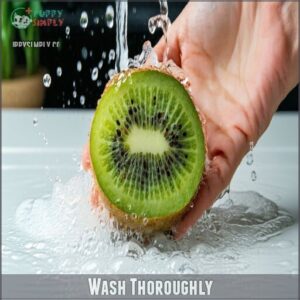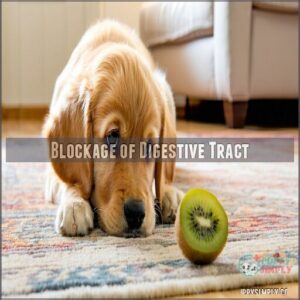This site is supported by our readers. We may earn a commission, at no cost to you, if you purchase through links.
 Dogs can eat kiwi, but there are a few things you should keep in mind to keep your pup safe and happy.
Dogs can eat kiwi, but there are a few things you should keep in mind to keep your pup safe and happy.
Kiwi is packed with Vitamin C, potassium, and fiber, making it a healthy treat in moderation.
However, always remove the fuzzy skin, as it can be tough to digest and might cause choking. Slice the fruit into small, bite-sized pieces to prevent any swallowing issues.
Watch for signs of an upset stomach or allergies, especially if it’s their first time trying it. When in doubt, check with your vet. Some fruits, like blueberries or apples, may suit your dog better, and it’s always good to consider alternative options.
Table Of Contents
- Key Takeaways
- Kiwi Nutritional Benefits
- Can Dogs Eat Kiwi
- Preparing Kiwi for Dogs
- Kiwi Safety and Risks
- Feeding Kiwi to Dogs
- Frequently Asked Questions (FAQs)
- Is any part of the kiwi poisonous?
- Is there a certain age when I can start feeding my dog kiwi?
- How much kiwi should I give to my dog?
- Is kiwi suitable for puppies?
- Are there any other fruits that I should avoid giving my dog?
- How should overripe kiwi be disposed of safely?
- Can dogs eat dehydrated or dried kiwi slices?
- Does kiwi interact with medications dogs might take?
- How does kiwi affect dog dental health?
- Can kiwi be used in homemade dog treats?
- Conclusion
Key Takeaways
- Peel the kiwi and cut it into small, bite-sized pieces to prevent choking and digestion issues.
- Feed kiwi in moderation since too much fiber or sugar can upset your dog’s stomach.
- Watch for allergic reactions or signs of digestive trouble, especially when introducing kiwi for the first time.
- Consult your vet before adding kiwi or any new food to your dog’s diet for personalized advice.
Kiwi Nutritional Benefits
You’ll find kiwi packs more vitamin C than oranges and more potassium than bananas, making it a nutrient powerhouse for both you and your dog in moderation.
This low-calorie fruit also contains vitamins A, E, K, calcium, and fiber, providing substantial nutritional benefits when prepared properly for canine consumption, making kiwi a great addition to a diet as a low-calorie fruit.
Rich in Vitamin C
Kiwis pack a powerful vitamin C punch, containing even more of this essential nutrient than oranges.
Kiwis deliver an impressive vitamin C boost, surpassing oranges, making them a refreshing and nutrient-packed addition to your dog’s treat rotation.
This makes them a potentially beneficial treat for your furry friend.
When considering kiwi for dogs, remember vitamin C offers:
- Immune system support that helps your dog fight off infections
- Antioxidant benefits that protect cells from damage
- Wound healing assistance and improved skin health
While dogs produce vitamin C naturally, small amounts of this dogsafe fruit can supplement their nutrition.
Some dogs enjoy kiwi, and kiwi berries are safe for canine consumption in moderation.
High in Potassium
Beyond vitamin C, potassium is another powerhouse nutrient found in kiwi.
This electrolyte helps maintain proper muscle function and heart health in both humans and dogs.
| Potassium Benefits | For Humans | For Dogs | Safe Amount |
|---|---|---|---|
| Heart Health | Excellent | Moderate | Limited |
| Muscle Function | Excellent | Good | Small pieces |
| Kidney Function | Beneficial | Minimal | Occasional |
| Electrolyte Balance | Important | Helpful | Tiny portions |
While kiwi contains more potassium than bananas, dogs should only consume it in tiny amounts due to its potential impact on their heart health and overall electrolyte balance.
Low in Calories
At just 42 calories per 100 grams, kiwi makes an excellent low-calorie option for your dog’s occasional treat regimen.
You’ll appreciate how this fruit contributes to weight management without sacrificing nutrition.
- Perfect for portion control when training active dogs
- Helps with obesity prevention when substituted for higher-calorie treats
- Supports healthy treat rotation in your dog’s diet
- Allows for guilt-free rewarding without calorie counting concerns
Abundant in Fiber
While the calorie count remains low, you’ll also find that kiwi packs an impressive fiber punch.
This tropical fruit contains both soluble and insoluble fiber that can support your dog’s digestive health.
The right amount may help maintain stool consistency and relieve dog constipation.
However, too much fiber can overwhelm your pup’s digestion system. For dogs with sensitive stomachs, consider gentler fiber alternatives instead of kiwi for dogs, focusing on digestive health and stool consistency.
Can Dogs Eat Kiwi
While kiwi offers impressive nutritional benefits for humans, you might wonder about dog kiwi consumption.
The good news is yes, dogs can eat kiwi in moderation.
This fuzzy fruit isn’t toxic to your furry friend, but dog kiwi safety requires some precautions.
Unlike commercial dog treats, kiwi contains natural vitamins and minerals that provide modest dog kiwi benefits.
However, it’s important to remember that dogs have different nutritional needs than humans.
Kiwi should be considered an occasional treat rather than a dietary staple.
Kiwi offers benefits like digestive enzyme support.
When considering kiwi vs. treats, remember that kiwi serving sizes should be limited based on your dog’s size.
A large dog might handle a few teaspoon-sized pieces, while smaller dogs should receive just one or two pieces.
For variety, explore kiwi alternatives like blueberries or apple slices that are equally safe for canine consumption.
Preparing Kiwi for Dogs
You’ll need to prepare kiwi properly before sharing this tasty treat with your furry friend.
Always peel the fuzzy skin and cut the fruit into small, bite-sized pieces appropriate for your dog’s size to prevent choking hazards and digestive issues.
Remove The Skin
Always peel off the fuzzy kiwi skin before offering it to your dog. The skin creates digestibility issues and poses a choking hazard for your furry friend.
- Kiwi skin contains insoluble fiber that’s tough for dogs to process
- Removing the skin decreases pesticide exposure substantially
- Peeled kiwifruit tastes better, matching your dog’s taste preference
- Skin removal reduces risk of intestinal blockages
- Dogs typically enjoy the softer texture of skinless kiwi
Slice Into Small Pieces
Cutting kiwi properly is essential for your dog’s safety. After removing the skin, slice the fruit into bite-sized pieces appropriate for your pup’s size to prevent choking.
Many owners find it helpful to use a dog treat slicer for consistent sizing.
| Dog Size | Piece Size | Max Pieces |
|---|---|---|
| Small (under 20 lbs) | Pea-sized | 1-2 pieces |
| Medium (21-50 lbs) | Dime-sized | 4-6 pieces |
| Large (over 50 lbs) | Quarter-sized | 8-10 pieces |
Size matters when preparing these manageable chunks for easy chewing.
Choose Ripe Kiwi
Selecting perfectly ripe kiwi is essential when sharing this treat with your furry friend.
Look for fruit that feels slightly soft when gently pressed but isn’t mushy.
Softness matters for easier digestion in your dog’s system.
The kiwi should have a sweet, fragrant smell and no bruising or dark spots.
Proper storage extends freshness—refrigerate ripe kiwis and keep unripe ones at room temperature, which helps in maintaining the kiwi‘s freshness and ensuring it remains a healthy treat.
Wash Thoroughly
Now that you’ve selected a ripe kiwi, don’t skip the washing step.
Thoroughly rinse your kiwi under cool running water to remove pesticides, dirt, and any harmful residues.
Safe handling of kiwi for dogs starts with proper washing techniques.
Even organic fruits may contain residue concerns that could affect your dog’s digestion.
A clean fruit guarantees your furry friend enjoys this treat without unnecessary exposure to chemicals.
Consider using dog-specific shampoo for an even more thorough clean, ensuring your dog’s digestion is protected.
Kiwi Safety and Risks
You’ll need to be aware of several risks when feeding kiwi to your dog, including potential choking hazards from whole fruit and digestive upset from the high fiber content.
While not toxic to dogs, kiwi should always be peeled, cut into appropriate bite-sized pieces, and given in moderation to prevent intestinal blockages or allergic reactions.
Choking Hazard
Now that you’ve properly prepared your kiwi, let’s talk safety. Whole kiwis pose a serious choking hazard for dogs, especially smaller breeds.
The kiwi size matters – your pup could choke when swallowing whole pieces. Always supervise eating and cut into bite-sized pieces to prevent blockage.
Even the fuzzy skin can get stuck in your dog’s throat. Consider dog kiwi safety when feeding your pet.
Know emergency actions in case your furry friend shows signs of choking while enjoying this tropical treat, and be aware of the importance of proper supervision to ensure your dog’s well-being.
Blockage of Digestive Tract
When fed improperly, kiwi can cause serious intestinal blockage in your dog.
The skin contains high levels of insoluble fiber that dogs can’t easily process.
Watch for these warning signs of obstruction:
- Vomiting or retching
- Lack of appetite or lethargy
- Visible abdominal pain or bloating
Never let your dog swallow whole kiwi pieces. Fiber overload from excessive consumption can also create digestion difficulties requiring immediate veterinary attention.
Gastrointestinal Upset
Beyond physical blockages, kiwi’s high fiber content can wreak havoc on your dog’s digestive system.
While fiber is beneficial in moderation, a fiber overload from kiwi can trigger gastrointestinal upset, leading to vomiting and diarrhea.
Dogs with sensitive stomachs are particularly vulnerable, sometimes developing pancreatitis from the sugar content.
Watch for loss of appetite after feeding kiwi—it’s your cue to stop and contact your vet immediately.
Allergic Reactions
Kiwi allergies in dogs can surprise even the most cautious pet owners. Watch your dog closely when offering kiwi for the first time. Symptoms like vomiting or diarrhea may signal an issue.
Remember that dogs can enjoy kiwi because it contains essential nutrients. Here’s what to remember:
- Monitor reaction symptoms carefully.
- Understand breed sensitivity to dog allergies.
- Consult veterinary guidance immediately if symptoms arise.
- Consider allergy testing.
- Stick with dog-safe fruits for treats.
Feeding Kiwi to Dogs
When feeding kiwi to your dog, it’s important to do so in moderation and with proper preparation.
Always peel the skin, cut the fruit into small pieces, and watch for any signs of an adverse reaction.
Moderation is Key
When feeding dogs kiwi, moderation is key to keeping them happy and healthy.
Too much kiwi can lead to fiber overload or high sugar intake, upsetting their digestive balance.
Stick to small, bite-sized dog kiwi portions, making it an occasional treat.
Proper portion control guarantees they enjoy the benefits without dietary imbalance.
Remember, treat frequency matters for their well-being.
Monitor Dog’s Reaction
Watch for digestive changes, allergic symptoms, or behavioral changes after offering kiwi for dogs.
Pay attention to stool consistency, appetite changes, or signs of discomfort. Even with the dog kiwi benefits, every pup reacts differently.
Dog kiwi risks like tummy troubles or upset digestion can occur, so always monitor closely. Keep dog kiwi safety tips in mind to guarantee a positive experience.
Consult Veterinarian
Before changing your dog’s diet or introducing kiwi, talk to your veterinarian. They’ll know your dog’s needs and any breed predispositions or health conditions to watch out for.
Personalized advice guarantees safety and helps avoid dog kiwi risks like upset stomachs. In emergency situations, such as allergic reactions, your vet can guide you.
Kiwi for dogs? Always double-check!
Alternative Fruits for Dogs
Offering fruits for dogs can be a treat, but not all are safe.
Safe fruits for dogs include bananas, blueberries, and watermelon, while toxic fruits like grapes and cherries should be avoided.
Always follow correct preparation methods, such as removing seeds and cutting bite-sized pieces, to ensure your dog’s safety.
These dog-friendly snacks add variety to your dog’s diet, but remember to serve them in appropriate serving sizes occasionally.
It’s important to research safe fruit options before offering them to your pet.
Frequently Asked Questions (FAQs)
Is any part of the kiwi poisonous?
No part of the kiwi is poisonous, but the fuzzy skin can cause stomach upset or choking, especially for dogs.
Always peel it before serving, and cut it into small, manageable pieces for safety.
Is there a certain age when I can start feeding my dog kiwi?
You can introduce kiwi to your dog when they’re around six months old or older.
Start small, peel it, and cut it into tiny pieces.
Always monitor their reaction and consult your vet first.
How much kiwi should I give to my dog?
Picture slicing a juicy kiwi—sweet and tangy.
Small dogs can enjoy 1–4 teaspoon-sized slices, medium-sized up to 6, and large dogs 8–
Always peel, dice, and monitor for any signs of digestive upset.
Is kiwi suitable for puppies?
Kiwi can be suitable for puppies in tiny amounts if prepared properly.
Peel, dice, and introduce it gradually.
Watch for any signs of stomach upset or allergies.
Always consult your vet before sharing new foods.
Are there any other fruits that I should avoid giving my dog?
While apples and blueberries are dog-friendly, avoid grapes, raisins, avocados, and cherries—they’re toxic and can harm kidneys or cause blockages.
Always remove seeds, pits, and peels, and consult your vet for safety.
How should overripe kiwi be disposed of safely?
Toss overripe kiwi into a compost bin if you have one; it’s great for enriching soil.
Otherwise, seal it in a biodegradable bag before discarding to avoid attracting pests or creating unpleasant odors.
Can dogs eat dehydrated or dried kiwi slices?
It’s surprising, but dried kiwi slices aren’t the best treat for dogs.
They’re condensed in sugar, which can upset their stomach or spike blood sugar.
Always opt for fresh, peeled kiwi in tiny, safe portions.
Does kiwi interact with medications dogs might take?
Certain medications might interact with kiwi due to its high vitamin C and potassium levels.
Always check with your vet before offering kiwi, especially if your dog takes supplements, diuretics, or heart-related medications.
How does kiwi affect dog dental health?
In the grand scheme of doggy dental care, kiwi’s acidity can wear down enamel over time, especially if eaten often.
Always rinse your dog’s mouth with water after feeding kiwi to minimize potential damage.
Can kiwi be used in homemade dog treats?
Yes, you can use kiwi in homemade dog treats, but keep portions small and always peel it.
Mix diced kiwi with dog-safe ingredients like plain yogurt or oats, ensuring the treat stays healthy and safe.
Conclusion
Feeding kiwi to your dog can be like offering a tiny tropical vacation, but safety comes first.
Dogs can eat kiwi, but only in moderation and with proper preparation.
Always peel the skin, slice it into small pieces, and watch for any signs of allergies or stomach upset.
Kiwi’s nutrients are great, but it’s not essential to your dog’s diet, and when unsure, consult your vet.
Remember, other fruits like apples or blueberries might be easier options.

















